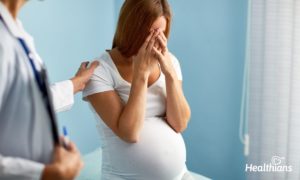Contributed by – Healthians Team
While the conversation around mental health issues is slowly increasing and becoming more common in the general public space, there is still a lot that most of us don’t know. Most people when they hear mental health, generally assume that the discussion is about depression. But, what they don’t know is that even depression can be of different types and each type of depression may have a different cause and treatment. So, here, in this article, we talk about common types of depression and their symptoms so that if you happen to notice these signs, you know what your next step should be.
Different types of depression

Major depression
Major depression or major depressive disorder (MDD) is a classic type of depression and the one which is most commonly reported. It has little to do with what is going on in life. One may have loving friends and family, a fulfilling job, and every other thing that most people dream about but could still have this type of depression and will experience the symptoms of major depression every day. These symptoms of depression may last for weeks or months. There can be just one episode of major depression or it can last for a lifetime. Whatever the case is, major depression can cause serious problems in daily activities and in relationships.
Symptoms of major depression:
- Depressed mood
- Losing interest in activities that earlier felt good
- Losing sleep or sleeping too much
- Loss of appetite
- Lack of concentration
- Unexplained aches and pains
- Feeling worthless
- Changes in weight
- Thoughts of self-harm or suicide
[Also read: Depression – Is it just a mental disorder?]
Persistent depression
Persistent depression or persistent depressive disorder is a type of chronic depression that lasts for at least two years. It may not be as intense as major depression but there’s still a chance that there will be small episodes of major depression. Although persistent depression is a long term depression, the severity of the symptoms keeps fluctuating.
Symptoms of persistent depression:
- Deep sadness
- Feeling hopeless
- Low self-esteem
- Lack of interest in things that earlier felt good
- Appetite changes
- Sleep pattern changes
- Low energy
- Lack of concentration
- Memory issues
- Social withdrawal
- Inability to feel joy
Bipolar disorder
The signature symptom of bipolar disorder or manic-depressive disorder is wide changes in mood, from elation to hopelessness. Diagnosis of bipolar disorder depends on at least a week of mania which can be mild or extreme to the level that it could risk the sense of reality and hospitalization might be needed.
Symptoms of depressive episodes are similar to those of major depression. And signs of the manic phase include:
- High energy
- Reduced sleep
- Irritability
- Increased confidence
- Feeling elated
- Unusual self-destructive behavior
- Racing thoughts and speech

Perinatal depression
Perinatal depression occurs during pregnancy. Clinically, it is known as a major depressive disorder with peripartum onset. One can also suffer from depression after giving birth, which is called postpartum depression. Hormonal changes during pregnancy and childbirth could be a cause of depression in women. Lack of sleep, physical discomfort, and changes in daily routine after childbirth compound the issue.
Symptoms of perinatal depression can be as severe as that of major depression.
- Feeling sad and hopeless
- Anger
- Exhaustion
- Difficulty caring for the newborn baby
- Extreme worry about the health of the baby
- Thoughts of self-harm or harming the baby
Depressive psychosis
Those who have major depression may also go through episodes of losing touch with reality. It can involve hallucinating, where they may see, hear, smell, taste, or feel things that aren’t there. Or they may have delusions where they will closely hold beliefs that might not make sense. Experiencing major depression and depressive psychosis together is called major depressive disorder with psychotic features. However, it is commonly referred to as depressive psychosis or psychotic depression.
Premenstrual dysphoric disorder
Premenstrual dysphoric disorder (PMDD) is a severe form of premenstrual syndrome (PMS). While PMS is both physical and psychological, PMDD is mainly psychological. Just like perinatal depression, it is believed that PMDD is also associated with hormones. Symptoms of PMDD usually start just after ovulation and ease up when the period arrives. Women tend to dismiss PMDD as just a bad PMS but it can get serious and lead to suicidal thoughts.
Symptoms of premenstrual dysphoric depression are:
- Cramps
- Bloating
- Tender breasts
- Headaches
- Joint pain
- Sadness
- Anger
- Irritability
- Food cravings
- Panic attacks
- Lack of energy
- Lack of concentration
- Sleep problems

Seasonal depression
Seasonal depression or seasonal affective disorder or clinically known as a major depressive disorder with a seasonal pattern is a type of depression that is related to certain seasons. Usually, it happens in the winter months. As the season progresses, symptoms get worse and then start easing up once the season begins to change.
Symptoms of seasonal depression are:
- Social withdrawal
- Increased sleep
- Weight gain
- Feelings of hopelessness and sadness
Situational depression
Situational depression is clinically known as adjustment disorder with depressed mood. It is similar to major depression in many ways. However, it only occurs as a result of a tragic life event such as the death of a loved one, divorce, or life-threatening event. Although it’s normal to feel sad and anxious when dealing with such events, the trouble starts when this depressed mood starts interfering with day-to-day life.
Symptoms of situational depression include:
- Frequent crying
- Feeling sad and hopeless
- Appetite changes
- Difficulty sleeping
- Body aches and pains
- Lack of energy
- Lack of concentration
- Social withdrawal
Atypical depression
Atypical depression which is clinically known as a major depressive disorder with atypical features is a type of depression that temporarily goes away in the light of any positive event. This type of depression can be challenging as one is not always depressed and that may make spotting it and learning to deal with it difficult.
Symptoms of atypical depression are:
- Increased appetite
- Weight gain
- Poor body image
- Sleeping more
- Insomnia
- Heaviness in arms and legs
- Sensitivity to criticism
- Body aches and pains
[Also read: Can you identify the presence of mental health disorder?]
The repercussions of living in a lockdown have started a much-needed conversation about mental health issues in society. People are finally talking about illnesses like depression openly and are checking on each other regularly. However, we are still far from a place where we know how to help a friend who may be suffering from depression. Learning about various types of depression could be a one step forward. With many types and causes, come various depression treatments that the doctor will plan. If you happen to spot these symptoms of depression in your friends or family or even in yourself, do not hesitate in asking for help.




